#Jason Woodrue
Explore tagged Tumblr posts
Text



I feel like we need some kind of funky dark magic underworld adventure starring Jason, Jason, and Jason. One's host to an ancient demon, one's died and come back, and the other's the demigod scion of the Olympian gods. The villain revealed to be at the root of whatever it is they're investigating should be Jason Woodrue.
#dc comics#red hood#jason todd#jason blood#etrigan#Jason#Son of Themyscira#Jason Woodrue#Floro#Floronic Man#Plant-master#and when things start going south there can be a cameo appearance of Jay Garrick zipping in to help bail them out
216 notes
·
View notes
Text


1984's Saga of Swamp Thing #23 page 23 (final splash page) by Stephen Bissette and John Totleben (words by writer Alan Moore). Source
#Saga of Swamp Thing#Alan Moore#comics#Swamp Thing#jason woodrue#floronic man#Stephen Bissette#John Totleben#dc comics#DC#pre crisisi#DC Comics of the 1980s#80's#80s#1980s comics#80s comics#swamp thing vs floronic man#epic#art#cool comic art#comic art#1980s comic books#greatest comic book runs ever#favorite of mine#not Alec holland#Alan moore's Swamp Thing#great cliffhanger#to be continued#splash page#woah
78 notes
·
View notes
Text
These emotionally unstable white men need to stop having the same fucking name, WHICH FUCKING JASON ARE Y’ALL TALKING ABOUT!!!!
#jason todd#jason peter todd#jason dean#jd heathers#jason voorhees#jason friday the 13th#this is mainly about these three but I am gonna tag every Jason I can think of#jason grace#jason blood#jason bard#jason rusch#jason gideon#jay garrick#jason the toymaker#jason lee scott#jason mendal#jason blossom#jason brody#jason bourne#jason bell#jason carver#jason cotc#jason falsettos#jason funderberker#jason hudson#jason woodrue#jason lannister#jason morgan#jason from my math class#Jason from my THEATER class
84 notes
·
View notes
Text


Poison Ivy #23 (2024)
written by G. Willow Wilson art by Haining & Arif Prianto
#red hood#harley quinn#floronic man#jason todd#DC#harleen quinzel#jason woodrue#wednesday spoilers#spoilers#comic spoilers
154 notes
·
View notes
Text





bunch of bits and bobs that made it to instagram but not here ft. scrow, jon+ed, woodrue, and a rare jason cameo
#scribbles#clipsverse#scarecrow#jonathan crane#edward nygma#jason woodrue#the joker#jason todd#body horror#gore#mild gore but still
42 notes
·
View notes
Text
It goes to show you really can't tell shit about a person from the content they make. Neil Gaiman introduced Pamela Isley's body being exploited by her male mentor as part of her tragic back story. Turned out whole time he was a rapist.
#neil gaiman#neil gaimen allegations#anti neil gaiman#social commentary#my commentary#cw sa#cw sa mention#tw sa#tw sa mention#cw grooming#tw grooming#comics#comic books#dc comics#poison ivy#pamela isley#jason woodrue#floronic man
31 notes
·
View notes
Text


Are they willingly ignoring the context of this scene where Poison Ivy gets revenge on a man who betrayed her, stole from her, and tried to kill her? While also making sure no one would believe her?
#harley quinn show#harley quinn series#harley quinn season 5#pamela isley#jason woodrue#poison ivy#harleen quinzel#harlivy#harley quinn#idiots on twitter#dc universe#dc harley quinn#dc animated series#dc animation#dc comics#dc characters#dcu#dc
19 notes
·
View notes
Text
Poison Ivy | G. Willow Wilson




ੈ✩🐊‧₊˚ Janet from HR, Killer Croc, and Grundy in Poison Ivy #22
#poison ivy#comics#dc#dc comics#ivy#pamela isley#jason woodrue#fiction#killer croc#Grundy#Janet from hr#g. willow wilson
53 notes
·
View notes
Text

Why is it that all the people you really care about get killed?
(Black Orchid Volume 1 #1)
#black orchid#jason woodrue#floronic man#poison ivy#pamela isley#swamp thing#alec holland#killed#the original writer#dave mckean#dc comics#comics#80s comics
16 notes
·
View notes
Text
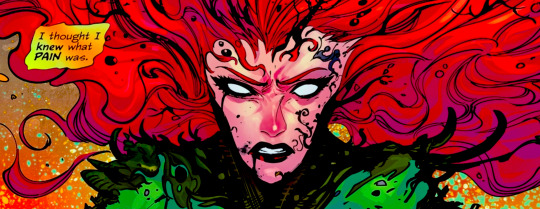
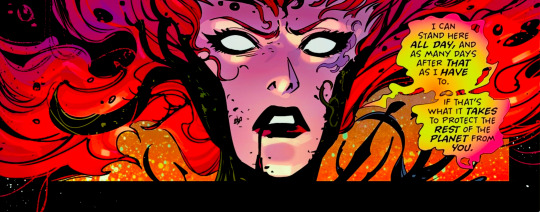
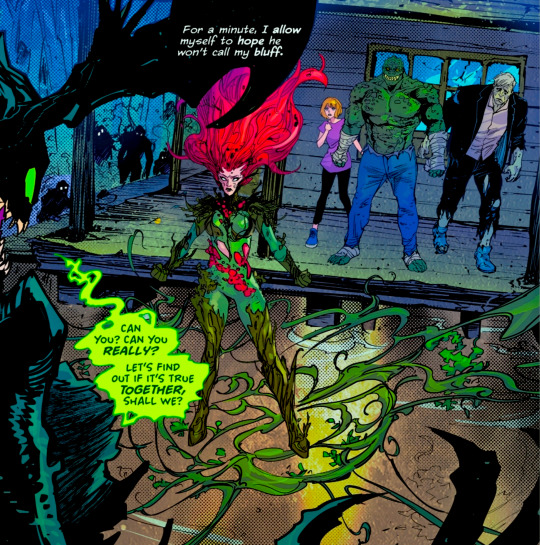
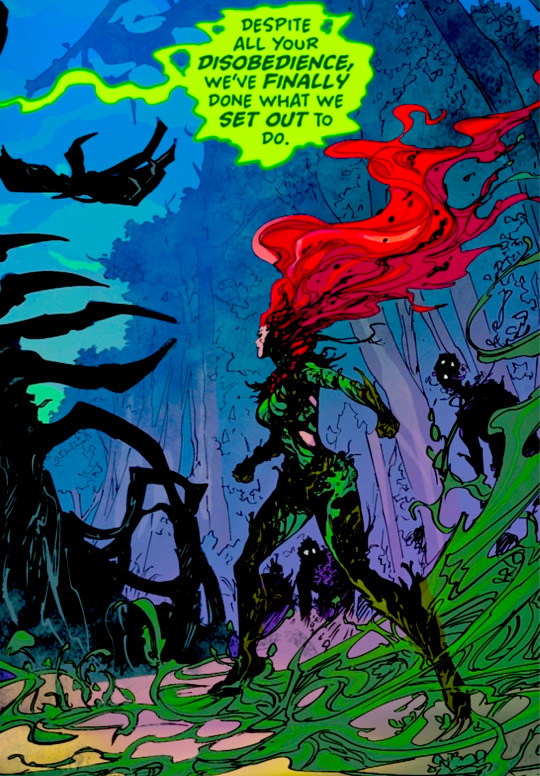
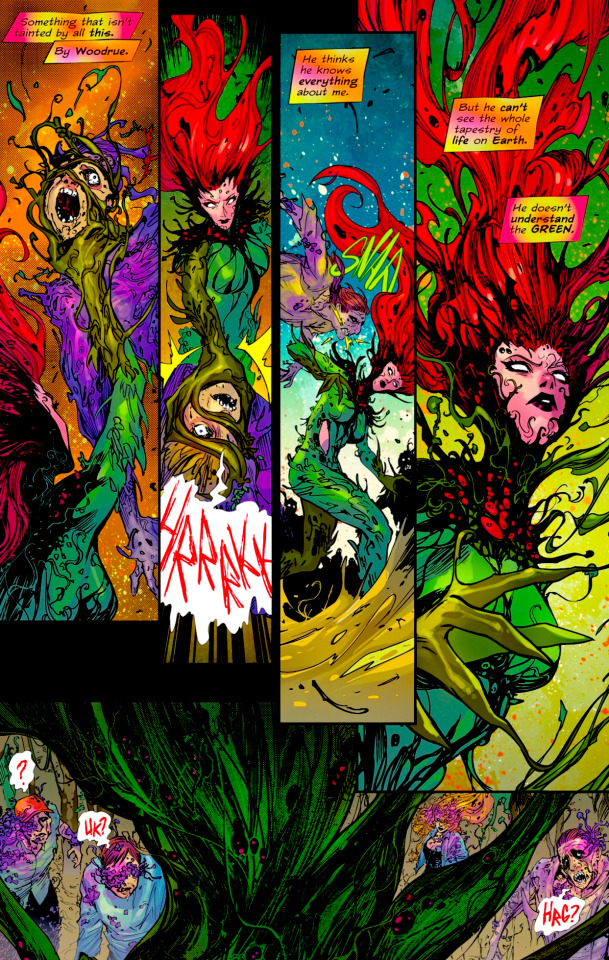
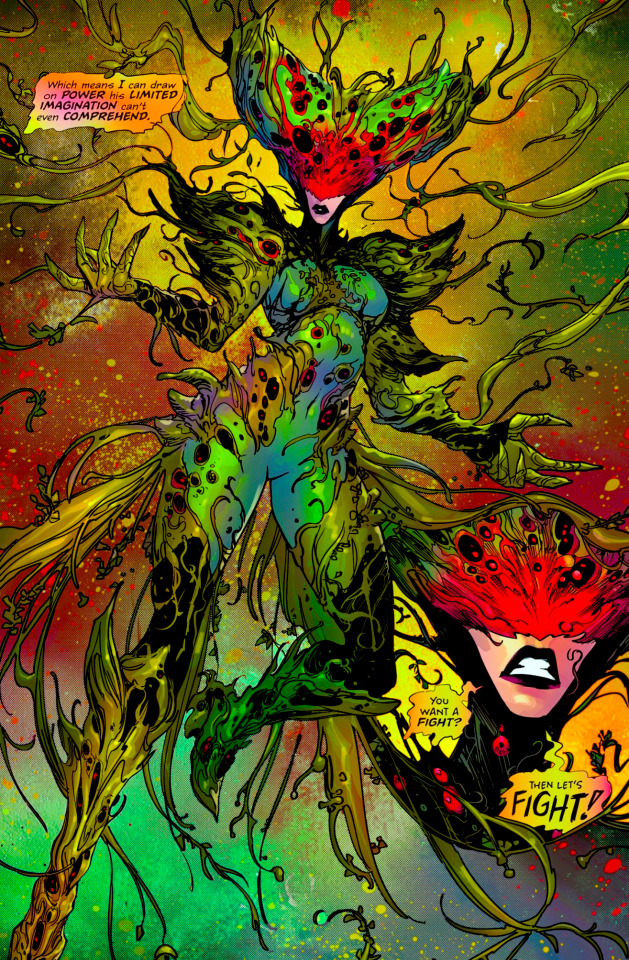
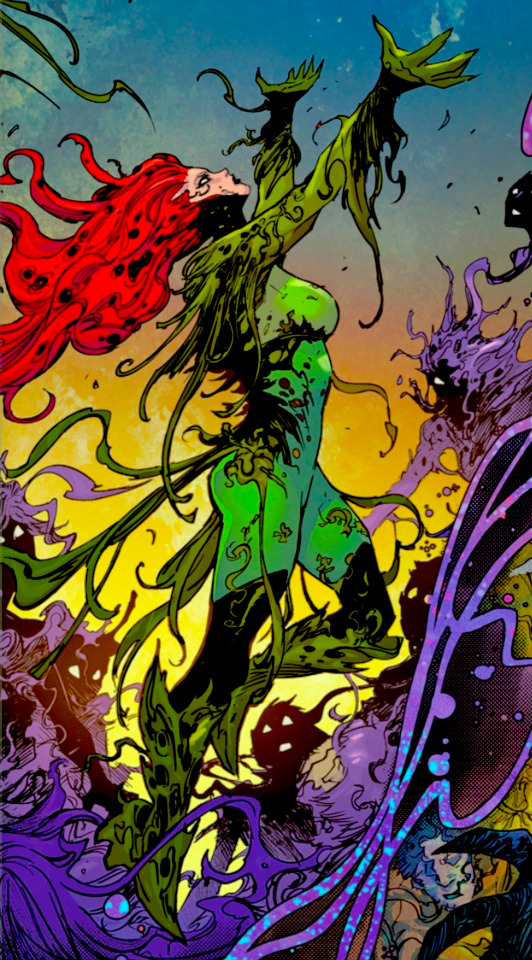
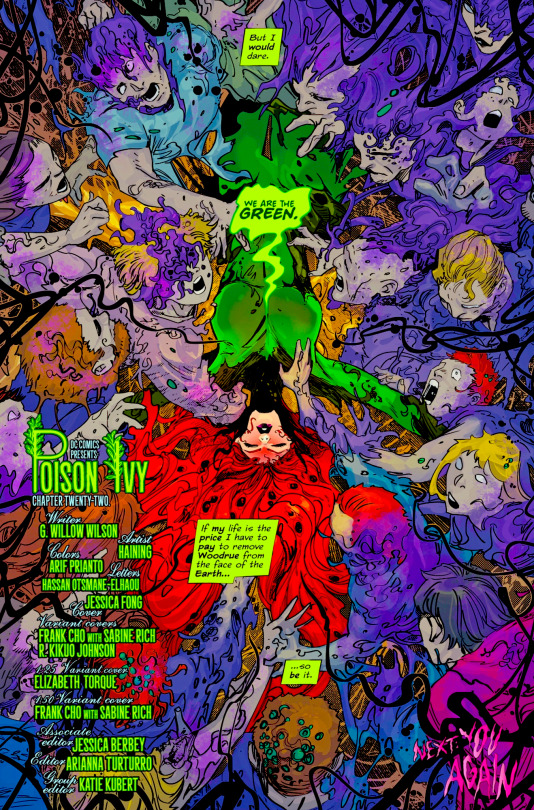
"we are the green" Poison Ivy #22 by G. Willow Wilson, Haining and Arif Prianto
#pamela isley#poison ivy#dc comics#tuesday spoilers#solomon grundy#killer croc#janet from hr#dc#pamela lillian isley#jason woodrue#floronic man#g willow wilson#comics#comic book art#cw zombie#captain of the green
52 notes
·
View notes
Text


babygirlifying that 50 yr old as we speak
#kevin durand#my babygirl#swamp thing 2019#jason woodrue#caroline woodrue#selena anduze#holding his face would heal me#also the size difference is making my monke brain do flips#*neuron activation*
29 notes
·
View notes
Text
Harley, Woodrue, and The Green: An in-depth analysis of Poison Ivy (2022)
(Discalaimer: This is an analysis of vol. 1 -issues 1-6- of the Poison Ivy series by G Willow Wilson, and it doesn��t take any later events into account. This is also over 2,400 words long so buckle up)
Hi!! I watched a video on how to analyse things and was inspired- I loved the first bit of Poison Ivy’s series and had a lot of fun going super in-depth into the writing, symbolism and psychology of Poison Ivy. So let’s get into it!
First, to make things easier, I’m going to assign some new meanings to the words “change” and “transformation”. Although this is not how these words usually work, in this analysis “change” refers to the way you choose to evolve. Change comes from within yourself and is never something forced. “Transformation” on the other hand, is something done to you by someone/something else. It is a violation of your personal autonomy and it erases your identity with a new one deemed as “better” by the other person’s standards. Now. Back to Ivy.
Transformation: What it means to Ivy
This theme appeares a lot in Ivy’s story. Her first instance of transformation is with Woodrue who experiments on her- transforming her body and mind against her will. He’s the one who first introduces this concept of “out with the old- in with the new”- something we end up seeing a lot of in Ivy’s ideology. “Nature is not sentimental” Woodrue says, “the strong consume the weak… this is the virtuous cycle.” The fact that “Virtuous Cycle” is the title of Vol. 1 should tell us a bit about how much Ivy has carried these ideas with her (more on that later).

[ID: A picture from the comic depicting Ivy's flashback to Woodrue's experiment. Narration: "She thinks it's going to kill her." Woodrue: "Nature is not sentimental. The strong consume the weak and then excrete them to fertilize the earth. That is the virtuous cycle. Consume. Digest. Renew." /end ID]
Like many villains (and heroes for that matter), she draws a clear line between her two identities. In her eyes, the identity of “Pamela Isley” represents everything wrong with humanity: she’s shortsighted and can’t see the bigger picture beyond her own emotions and she failed to acheive her goals because of her human need for love and validation. The identity of “Poison Ivy,” however, has embraced her transformation and has let her old identity be completely eradicated. Ivy isn’t human, she’s Greater, More Than human. She can see the bigger picture, the one humans could see if they weren’t so wrapped up in their silly mortal relationships. Poison Ivy is untouchable.
Until she’s not. Until her body is transformed against her will once again at the end of “Fear State,” but this time not into something stronger or greater. Although Ivy’s anger at Harley (issue #1) is in no way justified, it makes a little more sense when you consider how reminiscent this is of her backstory: changed forever against her will by the actions of someone she loves, cutting her off from her relationships (with Woodrue her green skin and powers/pheremones cut her off from humans, with Harley and Gardner she was cut off from her relationships with plants and the Green), and destroying all of her ideas for what her future would look like.

[ID: A picture from the comic where Ivy is losing her green skintone and preparing to drink the vial of Ophiocordyceps Lamia. Narration: "Every day I lose a little more of the power of Queen Ivy. Soon enough I'll be back to my old self. As the invincible parts of me die away. But there is one last chance to salvage something from all this. One final opportunity to carry out the will of the Green..." /end ID]
Of course Harley didn’t know that would happen and had just wanted to save her girlfriend, but she, and the readers, can also understand how triggering and painful it must have been for Ivy and that it’s realistic for her to lash out at first. What Harley doesn’t see is this: That Ivy’s spent years hating her past self and seeing Pamela Isley as the epitome of human weakness- and now she’s her again. From here on out, Pamela’s views of humanity as a whole are directly related to her view of herself. She thinks that humans aren’t essential to the environment, so she tells Harley “you saved the parts of me that didn’t mtter”. She beleives all of humanity must die via the Opiocordyceps Lamia, and although she makes an exception for Harley she doesn’t make one for herself. In her conversation with dream Harley, what they say (“It’s not too late to fix a mistake.”/“I wish that were true.” etc.) could be applied to either humanity as a whole or to Ivy’s view of herself as broken and unfixable. And, as her view of herself evolves, her view of humanity evolves with it.


[ID: Image one. Ivy and Harley are having an argument after Ivy has lost her connection to the Green. Harley: "We were trying to save your life!" Ivy: "You saved the parts of me that didn't matter!" Image two. A shot of a man consumed by the Ophiocordyceps Lamia. Narration: "Sucking up every resource on this planet until all that's left is a ball of superheated concrete. The only way to save this beatiful marble is to get rid of us. Every one of us. Even me. Because there is only one person who deserves all this beauty. And that's you." /end ID]
To carry out her new plan, Pamela goes “back to the beginning” and steals the Opiocordyceps Lamia from Jason Woodrue. It’s clear she still feels that she needs something from Woodrue in order to be Poison Ivy- after all, he’s her creator. Her breakup with Harley and her plans going forward seem to have grown from her desperate desire to prove that she’s still not entirely human, and won’t make human mistakes. In the first few issues, we get the sense that she would (at this point in her story) rather die than be Pamela Isley again. For her, escaping Pamela Isley means embracing the ideology of the man that killed her. Of course, Ivy doesn’t see it that way, but it’s not hard for us to see in the way she attempts to transform the other humans against their will like what Woodrue did to her. Watching the human’s shock and betrayal fade into awe that the beauty of the Green is reminiscent of how Ivy herself learned to love her connection to the Green despite the pain of her original transformation.

[ID: A scene from the comic where Janet is talking with Ivy while being consumed by the Ophiocordyceps Lamia. Narration: "Janet is part of something else now. Part of the life cycle of this riverbank." Janet: It's so beautiful. So clean. Like starting over." Ivy: "Right? Now you can see it too." Janet: "I want to see everything like you see. Take me with you. I don't want to go back to... to that." /end ID]
She also inherits Woodrue’s view of the natural world as something detatched from humanity with no room for human kindness and love (JW: “Nature is not sentimental”/PI: “Nature isn’t cruel, just efficient”). The same way Ivy unknowingly spreads Woodrues ideology, she is also unknowingly spreading his mind control virus in the form of Opiocordyceps Lamia. Throughout the story, transformation is a force of evil, violating someone’s autonomy in an attempt to make them a vessel for something greater. Yet the creator can never really control what people transform into…
Change: What it means to Ivy
Change is never on the table for Ivy. She is transformed by Woodrue and in turn tries to transform the planet and humanity. In every instance, whether it be about society or Ivy herself, her mindset is always that change is too late. Our life courses are set in stone by our own nature unless we are transformed by some greater force. This is why Ivy seeks out Woodrue after losing her connection to the Green, and why she is so focused on following the “will of the Green” rather than doing what she wants to. She doesn’t trust herself to make the right decisions (she’s been wrong too many times) so instead she wants some Other Force to transform her into someone who doesn’t make human mistakes. This rejection of change and worship of transformation was the basis of Ivy’s ideology. Until…
…Harley Quinn! Seeing Harley in this comic always brings with it a mild sense of disbelief. She seems so out of place within the comic’s mood and aesthetic… and I realized that it’s for a good reason. Harley Quinn is the epitome of change, she’s multifaceted and unpredictable and her path in life is never fixed. First she was going to become a gymnast, but then she was a psychologist, but then she fell in love with the Joker, but then she left him, but then she went back, and just when you think you see a pattern, when you think you know what she’ll do next, Harley does something else. She breaks up with the Joker for good, she falls in love with Ivy, they break up but not really, she starts to become a hero but her redemption arc itself is filled with messiness and unpredictability and all of it was her choice. Sure there was more than a little manipulation on the Joker’s part, but at the end of the day Harley chose to jump into that vat of acid— she wasn’t pushed.



[ID: Image one. A picture from the Gardener Files comic showing Ivy in a cell meeting Harley. Bella's Narration: "After years trapped in an echo chamber of her own dark thought, a woman was place in an adjacent cell. A young woman madle in love with a monster, trapped in a cycle of abuse. Harley Quinn." Image two. A scene from the end of the Fear State saga with Harley and Ivy talking. Ivy: "There's one more thing I need to to..." Ivy pulls Harley closer with vines. Harley: "Hoo-boy... Pammy... I know this is a lot to process and you don't like when I get all meddly... but I'm trying to be a good guy and save the city and junk-" Ivy: "Harley, stop talking." Harley: "Okay." The two kiss. Image three. Harley and Ivy from Ivy's dream in Poison Ivy (2022). Ivy: "I can't. I've gone to far to turn back now." Dream Harley: "It's never too late to fix a mistake." /end ID]
In every respect, Harley’s mere existence is the most persuasive argument against Ivy’s ideology. Although this might seem like a roadblock in their relationship, it’s actually the reson Ivy loves her so much. Harley’s ability to change is everything Ivy wishes humanity (and herself) could be. If more people were like Harley, not held back by societal norms and not paralyzed by the fear that it’s “too late” to change, then maybe Ivy could have more hope for humanity. (I can imagine Ivy, bored and self-righteous, meeting Dr. Quinzel for the first time, thinking she knows exactly what to expect from a young, naive psychologist. Then beginning to fall for Harley as she smashes Ivy’s expections again and again. That’s what a good joke is after all: building up an expectation and then subverting it. Anyways. Back to Ivy).
Ivy's Arc
Ultimately, Ivy/Pamela’s story is about her relationship to her own humanity, and the other characters’ role in the plot is to tug Pamela back and forth between two perspectives: Humanity (and by extension, Pamela) being irredeeamble and in need of a deadly transformation, vs humanity (and Pamela) having inherent value and being capable of changing and turning things around. Woodrue beleives that the only way to thrive in this dying world is to take advantage of the struggle around him to benefit himself. This is reflected in George Holloran, the boss at the packaging company Ivy works at for all of ten minutes (issue #4). Like Woodrue, he accepts the state of the world with no attempt to change anything, deciding to climb to the top of the hierarchy instead of trying to dismantle it. The guys at the bar (#1) also mirror this with their focus on satisfying their own desire rather than treat a woman with respect and (unlike Harley) do not stray even a little from Ivy’s expectations. They and Woodrue represent Ivy’s worst assumptions about humanity: that everyone is ruled by their own desire for power and pleasure and are incapable of changing or growing because of how society has shaped them.

[ID: A panel of Jason Woodrue as Floronic Man. Woodrue: "This planet is too far gone to save, Pamela. It needs a revolution, but all it wants is a band-aid. So we might as well make millions selling band-aids." /end ID]

[ID: A scene where George Halloran is being consumed by the Ophiocordyceps Lamia. George: "It's just hard, you know? To be the boss. At first you want everybody to like you. Th-then you realize it doesn't work. They hate you anyway. Because you're all in the same system. And the system chews people up. S-so you start to do things you shouldn't because you start to hate them back. You f-figure out that fear is more effective than love. And that's... when it all... goes dark." /end ID]
On the other hand, however, are characters like Jesslyn and Timothy at the packaging company (#4), Carrie at the motel (#3), Jenny Bolger at the restaurant (#2), and of course, Harley Quinn. Other than Harley, all of these characters are people struggling to make meaningful change in the confines of their normal lives under capitalism. Whether it’s through art, human connection, or focusing on a small peice of earth you can control, these people show Ivy what change looks like. It’s not as flashy and sudden as Ivy’s plan to transform everyone, and these aren’t the kind of stories Ivy would’ve known about had she simply looked on the news. But the willingness of all these people to at least try to help the world and each other is enough to make Ivy question her assumptions on the fixedness of human nature.

[ID: Two panels, one with Ivy and one with Carrie, the lady Ivy meets at the motel. Narration: "It's too early to make exceptions. Yet somehow, that's exactly what I find myself doing." Ivy: "-I don't want to get dirt all over you." Carrie: "Well. Suit yourself." /end ID]
When on her own, Ivy has no particular character growth, but when she is with these people, the good people, or when she has memories of Harley, those are the moments we see her grow and change. Ivy says she has faith in the world while working with Carrie, and her will to live comes back after sleeping with Jesslyn. And of course, everything always comes back to Harley, the love of her life. In the end, Ivy defeats Woodrue not because of her ideology but because he made the mistake of threatening Harley. This is the moment a lot of her developement has been leading up to. She’s lost all her powers, even the ones given to her by the Lamia. Like when she first became Poison Ivy, Woodrue has complete control over her body. Like before, she had trusted his science when she shouldn’t have. Manipulated, weak, and abandoned by the Green, there is barely anything left of Poison Ivy. She is almost entirely human. Almost entirely Pamela. Finally, she has no choice but to rely on her human instincts- her love for, and desire to protect, another human. And it works. Pamela Isley succeeded where Poison Ivy failed because of her humanity- not in spite of it.

[ID: A scene with Ivy and Woodrue in the comic, Woodure is forcing Ivy to hold a knife to her own neck via the Ophiocordyceps Lamia. Narration: "-simply have to accept that you've failed. Your enemy has won. And no one is coming to help." Woodrue: "And then I'm going to track down your little blonde girlfriend. --And I'm doing to turn her inside out. Not for any scientific purposes. Just because I can." Narration: "But that's not what happened this time." /end ID]
This is what ultimately opens her eyes to how, actually, these human instincts and human desires are what’s going to save the world. Her desire to protect Harley is the same as her deisre to protect the planet, which is the same as Carrie’s drive to save the plot of land by the motel, which is the same as Jenny’s drive to create art, and Jesslyn and Timothy’s drive to reach out to others and support each other in a hostile environment. After meeting a child and sensing the ecosystems he contained, Pamela comes to the conclusion that “we are the Green”. She realizes that our humanity is a feature, not a bug. We were designed to be here, and to love and protect the world and people around us. It’s when some people deny their humanity (for personal gain like Woodrue, or fear and self-hate like Ivy) that we start causing harm.

[ID: A scene from the comic where Ivy is picturing the faces of Jesslyn, Jenny and the nice guy from the restaurant. Narration: "Home. The only home any of us will ever have. Because nobody without billions of dollars to burn is going anywhere. And because-- after all-- we're not so bad. We can still gorw things. Gardens. Communities. Friendships. Against all odds. I realize, here at the end of everything, that I've been fighting the wrong people. Because it was easier. Easier than fighting the real enemies." /end ID]

[ID: A scene where Ivy is reaching out to a child who's handing her back her scarf. Narration: "--but when I look at this child, I see more than just one individual. We float in our own ecosystem of symbiotic bacteria. We exhale and the trees inhale. Billions of tiny organisms call our bodies home. To the microscopic beings alive on his skin, this child is the entire universe." Ivy: "...We are the Green." /end ID]
In eating Woodrue’s corpse (Iconic, by the way), she shows that she understands now that the blame for what he did to her lies with him, not her. In the end, she tells Harley that she “made me understand that we have to protect what is truly precious.” In other words, helped Ivy understand that protecting people is protecting the Green. She signs her name as “Pammy”, not “Ivy” or “Ives”. Maybe this is just because Harley calls her that, or maybe it’s because the identity of Pamela Isley has finally proven herself to Ivy.

[ID: A comic scene of Harley Quinn reading Ivy's letter (which is also the narration.) Narration/Letter: " --you've made me understand that we have to protect what is truly precious. I love you. And only you. Until the end of the world. No matter what. Always and forever, Your Pammy." /end ID]
If you read this far, THANK YOU!!! I love analysing stuff and hope to put out some more Poison Ivy analysis in the future. In the meantime, I really, really appreciate any comments, questions, or even disagreements. I would love nothing more than to have a conversation about Poison Ivy in the notes.
#Also#if anything about the formatting or writing style annoyed you lmk for future reference.#apologies for spelling errors I can't do shit without spellcheck#dc comics#harley quinn#poison ivy#pamela isley#harlivy#dcu#harleen quinzel#meta#analysis#character analysis#g willow wilson#marcio takara#batman fear state#batman comics#jason woodrue#floronic man#charles’ thoughts
28 notes
·
View notes
Text
Imma be honest not a single version of Poison Ivy's backstory has managed to make her getting seduced and manipulated by Jason Woodrue not seem completely stupid and out of character. She's already supposed to have been a jaded, misanthropic sociopath and a child abuse survivor before she even met him. And Woodrue's not exactly some masterful charismatic manipulator, he's a cackling nutjob with delusions of grandeur. If anything he seems like exactly the kind of moron who ends up getting manipulated by her. I guess the point is supposed to be that this kind of thing can happen to anyone but that still doesn't give writers carte blanche to not bother making it remotely believable. This is why my favorite version of Poison Ivy's origin story was Poison Ivy: Thorns where they just cut Woodrue out and have it be her dad who experimented on Pam as a child and gave her her powers. Partially because having two character defining abusive asshole male authority figures who instilled in her a mistrust/hatred for humanity is kinda redundant, and secondly because she's a kid and it's her dad and she had yet to become the sociopath we know and love so it makes total sense for her to fall for the gaslighting and manipulating, and to stay no matter how bad the abuse got.
#pamela isley#poison ivy#jason woodrue#floronic man#poison ivy thorns#dc#dcu#comics#tw abuse#tw abuse mention#tw child abuse
47 notes
·
View notes
Text



Swamp Thing 1x2
#stupid sexy kevin durand#jason woodrue#caroline woodrue#kevin durand#selana anduze#swamp thing 2019#tvedit#rarepair#gif#my gifs#remembered i have many clips of them saved#making gifs for MYSELF
12 notes
·
View notes
Text



Poison Ivy #22 (2024)
written by G. Willow Wilson art by Haining & Arif Prianto
75 notes
·
View notes
Text


dr woodrue....... a little weird guy. i won't spoil what exact relevance he has to ivy's backstory right now but i'll probably draw him more in the relative future because i'm on an ivy kick rn. his appearance is based off of the actor who played him in swamp thing (2019)
19 notes
·
View notes